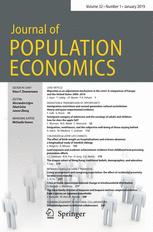Using data for Morocco, the paper provides further evidence that international migration fosters the transfer of political and social norms (social remittances).
Read more in:
Michele Tuccio, Jackline Wahba & Bachir Hamdouch
International migration as a driver of political and social change: evidence from Morocco
Journal of Population Economics, Vol. 32 (2019), Issue 4 (October), pp. 1171-1203.
FREE PAPER PDF.
GLO Fellows Michele Tuccio, Jackline Wahba & Bachir Hamdouch
The paper is also GLO Discussion Paper 309.
Journal Website, complete issue 4.
Author Abstract: This paper focuses on the impact of international migration on the transfer of political and social norms. Exploiting recent and unique data on Morocco, this paper explores whether households with return and current migrants bear different political preferences and behaviours than non-migrant families. Once controlling for the double selection into emigration and return migration, the findings suggest that having a returnee in the household increases the demand for political and social change. This result is driven by returnees mostly from Western European countries, who were exposed to more democratic norms in the destination. However, we find a negative impact of having a current migrant on the willingness of the left-behind households to change. This result is driven by migrants to non-Western countries, where the quality of political and social institutions is lower. Our results are robust to also controlling for destination selectivity.
Read also the Lead Article of issue 4 (2019):
Gautam Hazarika, Chandan Kumar & Sudipta Sarangi:
“Ancestral ecological endowments and missing women“
Journal of Population Economics, Vol. 32 (2019), Issue 4 (October), pp. 1101-1123
Journal Website, complete issue 4. Paper PDF – OPEN ACCESS.
GLO Fellows Gautam Hazarika, Chandan Kumar Jha & Sudipta Sarangi

Ends;

